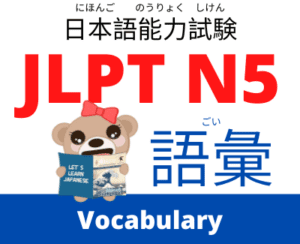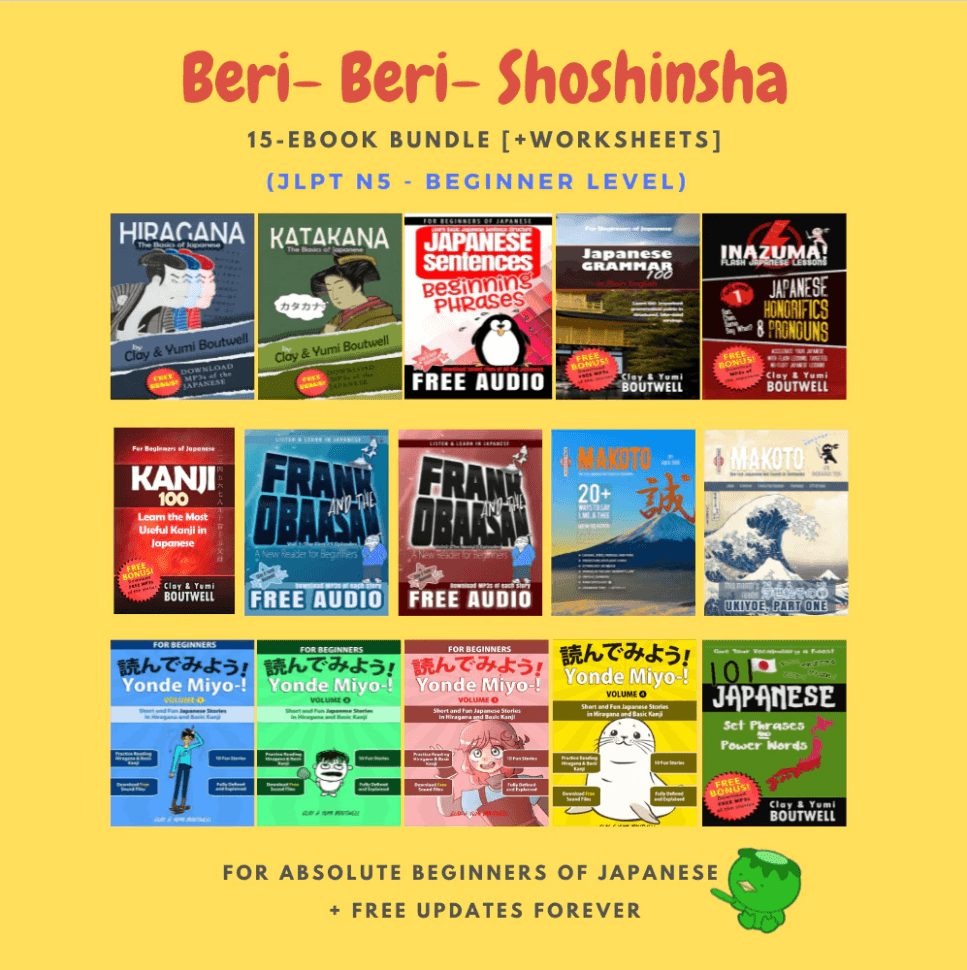
(ま)
【また】again
その犬はまた来ました。That dog came by again.
【まだ】not yet
まだ上手ではありません。I’m still not good.
【まち】town
この町の名前は何ですか?What is the name of this town?
【まつ】to wait
ここでちょっと待ってください。Please wait here a little.
【まっすぐ】straight
まっすぐに行きます。(I’m) going straight.
【マッチ】match
マッチは木でできています。Matches are made from wood.
【まど】window
窓から牛が見えます。(I) can see a cow from the window.
【まるい】round
地球は丸いです。The earth is round.
【まるい】round
円い大きな目。A large, round eye.
【まん】10,000
日本語で一万まで数えられます。I can count to 10,000 in Japanese.
【まんねんひつ】a fountain pen
万年筆がありますか?Do you have a fountain pen?
(み)
【みがく】to brush; polish
歯を磨きます。(I) am brushing my teeth.
【みぎ】right
パン屋さんが右にあります。There is a bakery to the right.
【みじかい】short
このベルトは、短いです。This belt is short.
【みず】water
この山の水は、おいしいです。This mountain water is delicious.
【みせ】store
店でパンを買いました。I bought bread at the store.
【みせる】to show
見せたいものがあります。I have something to show you.
【みち】road
この道はどこに行きますか?Where does this road go?
【みっか】the third (of the month)
三日は私の誕生日です。The third is my birthday.
【みっつ】three
一つ、二つ、三つ 1, 2, 3 (“native” Japanese counting)
【みどり】green
緑色が好きです。I like green.
【みなさん】everyone
皆さん、お元気でしたか?How has everyone been?
【みなみ】south
南のほうに行きます。I’m going south.
【みみ】ear
ぞうは大きな耳があります。Elephants have large ears.
【みる】to see
毎晩テレビを見ます。I watch TV every night.
【みんな】everyone
みんなによろしく伝えてください。Please tell everyone hello.
(む)
【むいか】the sixth (of the month)
今月の六日は会議があります。There is a meeting on the sixth of this month.
【むこう】to other side; over there
山の向こうに町があります。There is a town on the other side of the mountain.
【むずかしい】difficult
この本はちょっと難しい。This book is a little difficult.
【むっつ】six
四つ、五つ、六つ 4, 5, 6 (“native” Japanese counting)
【むら】village
あそこに小さな村があります。 There is a small village over there.
(め)
【め】eye
何か目に入っています。There is something in my eye.
【メートル】a meter
このプールは10メートルです。This pool is 10 meters (deep).
【めがね】eyeglasses
私のめがねはどこですか?Where are my glasses?
(も)
【もう】now; already
彼は、もう帰りました。He has already come back.
【もう】further; more; again
もう一度話してください。Please say (it) one more time.
【もくようび】Thursday
木曜日にデートします。(I) have a date on Thursday.
【もしもし】hello (on the phone)
もしもし、アオキです。Hello, this is Aoki.
【もつ】to hold
これをちょっと持ってください。Please hold this for a little bit.
【もっと】more
もっとゆっくり話してください。Please speak a little slower.
【もの】thing; object
これは私の物です。This is mine.
【もん】gate
門が閉まっています。The gate is closed.
【もんだい】problem
問題ありません。No problem.
(や)
【~や】house; store; shop
本屋に行きたいです。I’d like to go to the bookstore.
【やおや】a vegetable store; grocer
八百屋さんでにんじんを買ってください。Please buy some carrots at the vegetable store.
【やさい】 vegetable
毎日、もっと野菜を食べたほうがいい。You should eat more vegetables every day.
【やさしい】easy
この問題は易しいです。This problem (question) is easy.
【やすい】cheap; inexpensive
今週は、りんごが安いです。This week, apples are cheap.
【やすみ】vacation; take off time
この店は、毎週の月曜日が休みです。This store is closed every Monday.
【やすむ】to rest; to take off time
ちょっと病気なので今日は休みます。I’m a little sick so I will take today off.
【やっつ】eight
五つ、六つ、七つ、八つ 5, 6, 7, 8 (“native” Japanese counting)
【やま】mountain
山に登りたいです。I want to climb a mountain.
【やる】to do
今日は、仕事をやります。I will do work today.
(ゆ)
【ゆうはん】supper
夕飯は何がいいですか?What would be good for supper?
【ゆうびんきょく】post office
郵便局はどこですか?Where is the post office?
【ゆうべ】(last) evening
ゆうべ、何を食べましたか?What did you eat last night?
【ゆうめい】famous
あの女優は急に有名になりました。That actress became famous suddenly.
【ゆき】snow
今年の雪はひどい。This year’s snow is terrible.
【ゆっくり】slowly
ゆっくり食べましょう。Let’s eat slowly.
(よ)
【ようふく】western style clothing
デパートで洋服をかいました。I bought some western style clothing at the department store.
【よく】often
映画館によく行きます。I often go to the movies.
【よく】very well
よくできました。(You) did very well.
【よこ】side
車は家の横にあります。The car is by the side of the house.
【よっか】the fourth (of the month)
今日は、四日ですか?Is today the fourth?
【よっつ】four
一つ、二つ、三つ、四つ 1, 2, 3, 4 (“native” Japanese counting)
【よぶ】to call
いつでも呼んでください。Please call any time.
【よむ】to read
その雑誌を読みたいです。I’d like to read that magazine.
【よる】evening; night
夜、寝る前に必ず本を読みます。I always read a book before going to bed at night.
【よわい】weak
私は体が弱いです。My body is weak. (I am weak.)
(ら)
【らいげつ】next month
来月までに宿題をします。I will do my homework by next month.
【らいしゅう】next week
来週、日本に行きます。Next week, I’m going to Japan.
【らいねん】next year
来年までに100個の漢字を覚えたいです。I’d like to learn 100 kanji before next year.
【ラジオ】radio
車でよくラジオを聞きます。I often listen to the radio in the car.
【ラジカセ】a radio cassette recorder
この古いラジカセはCDがついていません。This old radio cassette player doesn’t have a CD player.
(り)
【りっぱ】great; fine
さっきのあなたの態度は、りっぱでした。The way you just acted (your attitude), was superb.
【りゅうがくせい】student studying abroad
若いころ留学生でした。As a youth, I studied abroad.
【りょうしん】parents
両親は今アメリカにいます。My parents are now in America.
【りょうり】cooking
あなたの料理はおいしいです。Your cooking is delicious.
【りょこう】travel; trip
いっしょに旅行しませんか?Why don’t we travel together?
(れ)
【れい】zero
零はゼロのことです。“Rei” means zero.
【れいぞうこ】refrigerator
牛乳は冷蔵庫の中です。 The milk is in the refrigerator.
【レコード】record
最近、レコードは珍しいです。Records are rare these days.
【レストラン】restaurant
レストランで食べましょう。Let’s eat at a restaurant.
【れんしゅう】practice
毎日、漢字を練習しています。 I practice kanji every day.
(ろ)
【ろうか】a hall; a corridor
ろうかが汚いです。The hall is dirty.
【ろく】six
中国語で六まで数えられます。I can count to six in Chinese.
(わ)
【ワイシャツ】a shirt
私のお父さんはよくワイシャツを着ます。My father wears t-shirts often.
【わかい】young
実はビルはまだ若いです。Actually, Bill is still young.
【わかる】to know; to understand
この問題はわかりますか?Do you understand this problem (or test question)?
【わすれる】to forget
宿題を忘れました。 I forgot my homework.
【わたくし/わたし】I, me
私はカナダ人です。 I am Canadian.
【わたす】to deliver; to hand something over
彼にこの書類を渡してください。 Please hand him these papers.
【わたる】to cross
道を渡る前によく見てください。Before crossing the street, look carefully.
【わるい】bad
あなたのほうが悪いと思います。I think it is your fault.





